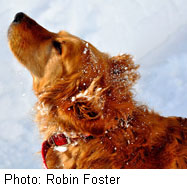- Stigma, Shame Hit Many Gay Men Affected by Mpox Outbreak
- Calories, Not Meal Timing, Key to Weight Loss: Study
- Dietary Changes May Beat Meds in Treating IBS
- Screen Pregnant Women for Syphilis, Ob-Gyn Group Advises
- Even With Weight Gain, Quitting Smoking in Pregnancy Still Best for Health
- A-Fib Is Strong Precursor to Heart Failure
- One Neurological Factor Keeps Black, Hispanic Patients From Alzheimer’s Clinical Trials
- Managing Blood Sugar After Stroke Could Be Key to Outcomes
- Dozens of COVID Virus Mutations Arose in Man With Longest Known Case
- Blood Test Might Someday Diagnose Early MS
Dogs’ Evolutionary Origins Get More Complicated


Dogs and wolves had already become evolutionarily distinct long before humans settled down to agriculture, new genetic research suggests.
Dogs and wolves appear to have evolved from a common ancestor between 9,000 and 34,000 years ago, according to a new study from a team at the University of Chicago.
The researchers also discovered that today’s dogs are more closely related to each other than they are to wolves, regardless of a dog’s geographic origins. This suggests that some of the genetic similarities between dogs and wolves are due to interbreeding after dogs became domesticated, rather than a direct line of descent from one group of wolves, the researchers said.
The findings indicate that dogs’ origins might be more complicated than the popular belief that early farmers domesticated friendly wolves that later evolved into dogs, the researchers said.
Instead, the first dogs may have lived with people who were hunter-gatherers, and dogs later adapted to agricultural life, according to the authors of the study, which was published Jan. 16 in the journal PLoS Genetics.
“Dog domestication is more complex than we originally thought,” study senior author John Novembre, an associate professor in the department of human genetics, said in a University of Chicago Medical Center news release.
“In this analysis we didn’t see clear evidence in favor of a multi-regional model, or a single origin from one of the living wolves that we sampled,” Novembre said. “It makes the field of dog domestication very intriguing going forward.”
The researchers sequenced the genomes of three gray wolves from China, Croatia and Israel — three regions where dogs are believed to have originated. They also sequenced the genomes of two dog breeds: a basenji, which originated in central Africa, and a dingo from Australia. These areas never had modern wolf populations.
The team compared the genomes of the basenji and the dingo to a previously published genome of a boxer from Europe, and found that these dog breeds were more closely related to each other than they were to the wolves.
The researchers also found that the three wolves from the different geographic regions were more closely related to each other than to any of the dogs.
More information
The Public Broadcasting Service has more about the evolution of dogs.
Source: HealthDay
Copyright © 2024 HealthDay. All rights reserved.










